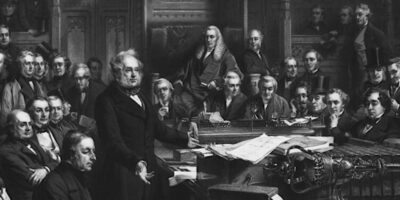A Different Sort of Central Planning
The great economic debate of the last century concerned markets vs. central planning. It was a contest over which path is best for sustainable prosperity, inclusive wealth creation, and progress.
The theory of central planning is this: smart people with resources and power can do a better job in planning production than consumers and private enterprises. The contra case is this: the knowledge necessary for economic planning is not vested in intellectuals and officials but rather in institutions, processes, and systems that emerge from hands-on action in real markets.
By century’s end, the debate seemed to be settled. Central planning failed and markets won.
Or so we believed.
The great lesson of the history of political economy is that nothing is ever settled, at least not philosophically or ideologically. There is always another round, another debate, another iteration of the same fallacies, another pattern of central planning that has to be refuted, beat back, and finally defeated in order for market forces to maintain control.
The style of central planning known as Soviet and New Deal – a difference in degree not kind – has indeed left vogue in the midst of public opposition and a crisis of intellectual confidence. It has proven unworkable, destructive, and deeply unpopular.
Maintaining the apparatus behind this theory has become a challenge for politicians with a stake in the status quo. There are just too many anomalies extant to make the theory plausible. What is more functional and socially beneficial: the post office or the app economy, the DMV or Amazon, Congress or WalMart, the taxi monopoly or Uber? We know the answer.
Economic Nationalism
Meanwhile, however, another form of central planning has come to take its place. The form it is taking is economic nationalism. Its policies are protectionism and migration restriction. With those policies come new forms of restriction on freedom and new methods for pillaging the population of private wealth.
The methods are new in our time, but not in the sweep of history. The protectionism being pushed by the United States dates to a precapitalist age, in the latter years of feudalism when competition of the modern form was looked upon as far too chaotic. It was typical of the local baron, prince, lord, or king to believe himself to be charged with permissioning elites into the commercial life of the commonwealth.
Let’s say you believe you are the best carpenter in town. The protector of the realm relies on your services, which you provide at a discounted rate in exchange for a favor: you and only you can control the entire industry, who gets to practice and under what terms. The same is true in medicine, building, blacksmithing, shoemaking and other arts. The result was an elaborate guild system that during the Middle Ages came to control nearly all professional services and goods production in Europe.
Along with that came severe restrictions on imports in order to keep prices higher for the services of local guilds. Such restrictions were justified by the economic doctrine of mercantilism, the belief that it is best for a nation to possess as much physical money as possible. This is achieved by restricting imports and encouraging exports.
These systems are all anti-competitive by intent. There was no pretense of science going on here. It was all about control, revenue, and power, what today might be called cronyism. And the great glory of capitalism, as even Karl Marx admitted, was that it broke down these systems, invited anyone and everyone into the economic process, and put consumers in charge of the productive life of a nation, and not just the nation but the world.
Marx wrote:
Modern industry has established the world market, for which the discovery of America paved the way. This market has given an immense development to commerce, to navigation, to communication by land. This development has, in its turn, reacted on the extension of industry; and in proportion as industry, commerce, navigation, railways extended, in the same proportion the bourgeoisie developed, increased its capital, and pushed into the background every class handed down from the Middle Ages.
Free trade was a glorious achievement. It has never been perfectly realized but the ideal ascended as the centuries passed and trade barriers, both internally in the nation and externally to the world, began to fall. There are very few good things to say about economic policy in the developed world since World War II but this is one of them: there was a gradual reduction in barriers to trade. All this progress is in the process of being attacked and even reversed with this rise of economic nationalism.
Demographic Planning
A related problem area concerns the planning of the demographics of nation. After all, if you aspire to some kind of centralized control over society, it makes sense that one would first have to gain some control over the anarchy of reproduction. You can’t just leave it to individuals to produce much less import more people. There has to be a plan.
The idea of population planning was not a precapitalist notion. It came to the world following the dramatic change in lifespans and infant mortality following the incredible rise in prosperity of the mid-19th century. By the end of the century, you had a generation of intellectuals, both in Europe and the United States, plotting to treat the human population the way a farmer/rancher manages his livestock. The resulting science was called eugenics. Its methods were sterilization, exclusion, separation, and control of migration. Eugenics ascended to a place of unquestioned doctrine by the early years of the 20th century.
“Darwin and his followers laid the foundation of the science of eugenics,” wrote Harvard professor Robert DeCourcy Ward (1867–1931) in his manifesto published in the North American Review in July 1910. “They have shown us the methods and possibilities of the product of new species of plants and animals…. In fact, artificial selection has been applied to almost every living thing with which man has close relations except man himself.”
“Why,” Ward demanded, “should the breeding of man, the most important animal of all, alone be left to chance?”
Ward, a man of impeccable scholarly credentials, founded the American Restriction League. It was one of the first organizations to advocate reversing the traditional American policy of free immigration and replacing it with a “scientific” approach rooted in Darwinian evolutionary theory and the policy of eugenics.
Centered in Boston, the league eventually expanded to New York, Chicago, and San Francisco. Its science inspired a dramatic change in US policy over labor law, marriage policy, city planning, and, its greatest achievements, the 1921 Emergency Quota Act and the 1924 Immigration Act, which targeted Jews, Slavs, and Italians as eugenic threats. These were the first-ever legislated limits on the number of immigrants who could come to the United States.
How is it possible to sell such an idea politically? We see it in our own time. You create an environment of us vs. them. The outsiders are called invaders and said to be a threat to the health, safety, and well being of the domestic population.
The sales pitch is premised on a claim that the people of the nation have some special virtue that outsiders do not. It could be religion. It could be language. It could be race. Whatever your theory of what constitutes the nation, the goal of the political rhetoric is to collectivize the people under a leadership principle – the head of state as the father of the nation.
The people are being manipulated to imagine that they are preserving the integrity of the national community against outside invasion. They put up with surveillance, raids on businesses, a papers-please policy of checkpoints and internal controls, all enforced by armed agents of a once-limited state. They imagine that they are making the nation great, oblivious to the reality that the entire apparatus is constructed for the different purpose of making the state more powerful.
It’s Back Again
Economic nationalism, characterized by restriction on trade and migration toward the goal of political control, has a different sales pitch and cultural feel from the central planning of generations past. But it is no less an attack on free enterprise, industrial rivalry, and consumer control of production. Ultimately it is just another way to undermine property rights, freedom, and the limits on the power of the state.
It is another form of central planning, one pushed by the “right” as opposed to the “left,” and it stands in opposition to the great alternative to all forms of government imposition, namely liberalism. Whether we are talking about industries or people, government should not be in the business of picking winners and losers in the marketplace, nor daring to dictate to a free people the source and nature of their personal loyalties.












